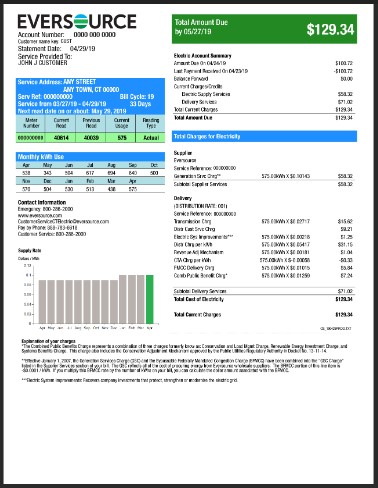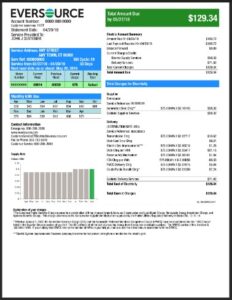What is the average monthly electric bill?

Understanding the Average Monthly Electric Bill
For many businesses and households, the monthly electric bill is a significant expense that can put a strain on the budget. Understanding the factors that influence the average monthly electric bill is crucial in finding effective ways to lower costs. This article aims to shed light on the average monthly electric bill and introduce Bid On Energy as a solution to reduce electricity expenses. The average monthly electric bill varies based on several factors, including location, household size, energy consumption patterns, and the prevailing electricity rates. Let's explore the key elements that contribute to the average monthly electric bill:
Energy Consumption:
The amount of electricity consumed by a household has a direct impact on the monthly bill. Appliances, heating and cooling systems, lighting, and other electrical devices contribute to overall energy usage. Energy-efficient practices, such as using energy-saving appliances and turning off lights when not in use, can help reduce consumption and lower the electric bill.
Electricity Rates:
The cost per kilowatt-hour (kWh) of electricity, also known as the electricity rate, plays a significant role in determining the monthly bill. Electricity rates vary by region and can be influenced by factors such as fuel costs, infrastructure maintenance, and regulatory requirements. Higher electricity rates result in higher monthly bills, while lower rates can lead to cost savings.
Time of Use:
Some utility providers offer time-of-use (TOU) pricing, where electricity rates vary depending on the time of day. Peak hours, typically during the evening when energy demand is highest, may have higher rates compared to off-peak hours. Understanding and adjusting energy usage during peak hours can help lower the monthly bill for households on TOU pricing plans.
Introducing Bid On Energy for Lower Electric Bills:
Bid On Energy is a valuable resource that can assist consumers in reducing their monthly electric bills. Here's how Bid On Energy can help:
Energy Supplier Options:
Bid On Energy provides access to a network of electricity suppliers, allowing consumers to explore a range of options beyond their local utility provider. These suppliers offer competitive rates, innovative pricing plans, and renewable energy options. By comparing and choosing the most favorable supplier, consumers can potentially lower their monthly electric bills.
Transparent Pricing and Plan Comparison:
Bid On Energy offers transparent pricing information from multiple suppliers, enabling consumers to compare plans side by side. This transparency empowers individuals to make informed decisions about the best pricing options for their specific needs. By understanding the costs and benefits of different plans, consumers can select the most cost-effective solution.
Contract Flexibility:
Bid On Energy offers flexibility in choosing contract terms that align with consumers' preferences. Users can select contract durations that suit their needs, whether short-term or long-term. This flexibility allows individuals to adapt their electricity plans based on changing circumstances, optimizing cost savings.
Expert Guidance and Support:
Bid On Energy provides access to knowledgeable energy professionals who can offer guidance and support throughout the process of selecting a supplier. These experts can help consumers understand the terms and conditions of different contracts, clarify any questions, and assist in securing the best deal to lower monthly electric bills.
The average monthly electric bill is influenced by factors such as energy consumption, electricity rates, and time-of-use pricing. By adopting energy-efficient practices and making informed choices about electricity suppliers, consumers can effectively lower their monthly electric bills.
Bid On Energy serves as a valuable tool in this endeavor, providing access to a wide range of energy suppliers, transparent pricing information, flexible contract options, and expert guidance. By leveraging the benefits of Bid On Energy, individuals can take control of their electric bills and potentially realize substantial cost savings.
The average commercial monthly electric bill can vary significantly depending on various factors, including the size of the commercial establishment, energy consumption, location, and specific utility rates. However, to provide a general idea, I can provide an approximate range based on available data.
In the United States, the average commercial monthly electric bill can range from a few hundred dollars to several thousand dollars. Smaller businesses or establishments with low energy usage might have average monthly bills in the range of $200 to $500. Medium-sized businesses with moderate energy consumption could expect average bills in the range of $500 to $1,500. Larger commercial establishments or those with higher energy demands, such as factories or large office buildings, may have average monthly bills ranging from $1,500 to $5,000 or more.
It's important to note that these figures are approximate and can vary significantly depending on factors specific to each business, such as industry type, size, energy efficiency measures, peak demand charges, and regional electricity rates. For accurate and up-to-date information regarding commercial electric bills, it's recommended to consult with the specific utility provider or an energy professional familiar with the area and the business's energy consumption patterns.
Here is a list of energy deregulated states in the United States, along with the average monthly commercial electric bill and some utilities operating in those states:
Texas:
Average Monthly Commercial Electric Bill: The average monthly commercial electric bill in Texas can range from $500 to $3,000, depending on the size of the business and energy consumption.
Major Utilities: CenterPoint Energy, Oncor Electric Delivery, AEP Texas, TNMP (Texas-New Mexico Power), Sharyland Utilities, and more.
New York:
Average Monthly Commercial Electric Bill: The average monthly commercial electric bill in New York can range from $300 to $2,000, depending on factors such as the size of the business, energy usage, and location.
Major Utilities: Con Edison, National Grid, NYSEG, RG&E, Orange and Rockland Utilities, and more.
Illinois:
Average Monthly Commercial Electric Bill: The average monthly commercial electric bill in Illinois can range from $400 to $2,000, depending on factors such as the size of the business, energy usage, and location.
Major Utilities: Commonwealth Edison (ComEd), Ameren Illinois, MidAmerican Energy, and more.
Pennsylvania:
Average Monthly Commercial Electric Bill: The average monthly commercial electric bill in Pennsylvania can range from $400 to $2,500, depending on factors such as the size of the business, energy usage, and location.
Major Utilities: PECO Energy, PPL Electric Utilities, Duquesne Light Company, Met-Ed (FirstEnergy), Penelec (FirstEnergy), and more.
Ohio:
Average Monthly Commercial Electric Bill: The average monthly commercial electric bill in Ohio can range from $400 to $2,000, depending on factors such as the size of the business, energy usage, and location.
Major Utilities: AEP Ohio, Duke Energy Ohio, Dayton Power and Light (AES), FirstEnergy Ohio utilities (The Illuminating Company, Toledo Edison, Ohio Edison), and more.
Massachusetts:
Average Monthly Commercial Electric Bill: The average monthly commercial electric bill in Massachusetts can range from $400 to $2,000, depending on factors such as the size of the business, energy usage, and location.
Major Utilities: Eversource Energy, National Grid, Unitil, and more.
Maryland:
Average Monthly Commercial Electric Bill: The average monthly commercial electric bill in Maryland can range from $400 to $2,500, depending on factors such as the size of the business, energy usage, and location.
Major Utilities: BGE (Baltimore Gas and Electric), Pepco, Delmarva Power, Potomac Edison, and more.
New Jersey:
Average Monthly Commercial Electric Bill: The average monthly commercial electric bill in New Jersey can range from $300 to $2,000, depending on factors such as the size of the business, energy usage, and location.
Major Utilities: Public Service Electric and Gas (PSE&G), Atlantic City Electric, Jersey Central Power & Light (JCP&L), Rockland Electric Company, and more.
Connecticut:
Average Monthly Commercial Electric Bill: The average monthly commercial electric bill in Connecticut can range from $400 to $2,000, depending on factors such as the size of the business, energy usage, and location.
Major Utilities: Eversource Energy, United Illuminating (UI), and more.
Rhode Island:
Average Monthly Commercial Electric Bill: The average monthly commercial electric bill in Rhode Island can range from $400 to $2,000, depending on factors such as the size of the business, energy usage, and location.
Major Utilities: National Grid, Pascoag Utility District, and more.
New Hampshire:
Average Monthly Commercial Electric Bill: The average monthly commercial electric bill in New Hampshire can range from $400 to $2,000, depending on factors such as the size of the business, energy usage, and location.
Major Utilities: Eversource Energy, Liberty Utilities, Unitil, and more.
Maine:
Average Monthly Commercial Electric Bill: The average monthly commercial electric bill in Maine can range from $400 to $2,000, depending on factors such as the size of the business, energy usage, and location.
Major Utilities: Central Maine Power (CMP), Emera Maine (Bangor Hydro District), and more.
Delaware:
Average Monthly Commercial Electric Bill: The average monthly commercial electric bill in Delaware can range from $400 to $2,000, depending on factors such as the size of the business, energy usage, and location.
Major Utilities: Delmarva Power, Choptank Electric Cooperative, and more.
Michigan:
Average Monthly Commercial Electric Bill: The average monthly commercial electric bill in Michigan can range from $400 to $2,000, depending on factors such as the size of the business, energy usage, and location.
Major Utilities: DTE Energy, Consumers Energy, Indiana Michigan Power, Upper Peninsula Power Company, and more.
Georgia:
Average Monthly Commercial Electric Bill: The average monthly commercial electric bill in Georgia can range from $400 to $2,000, depending on factors such as the size of the business, energy usage, and location.
Major Utilities: Georgia Power, Atlanta Gas Light, and more.
Virginia:
Average Monthly Commercial Electric Bill: The average monthly commercial electric bill in Virginia can range from $400 to $2,000, depending on factors such as the size of the business, energy usage, and location.
Major Utilities: Dominion Energy Virginia, Appalachian Power, and more.
Washington, D.C.:
Average Monthly Commercial Electric Bill: The average monthly commercial electric bill in Washington, D.C., can range from $400 to $2,000, depending on factors such as the size of the business, energy usage, and location.
Major Utilities: Pepco, Potomac Electric Power Company.
Oklahoma:
Average Monthly Commercial Electric Bill: The average monthly commercial electric bill in Oklahoma can range from $400 to $2,000, depending on factors such as the size of the business, energy usage, and location.
Major Utilities: Public Service Company of Oklahoma (PSO), Oklahoma Gas & Electric (OG&E), and more.
Nebraska:
Average Monthly Commercial Electric Bill: The average monthly commercial electric bill in Nebraska can range from $400 to $2,000, depending on factors such as the size of the business, energy usage, and location.
Major Utilities: Omaha Public Power District (OPPD), Nebraska Public Power District (NPPD), and more.
Montana:
Average Monthly Commercial Electric Bill: The average monthly commercial electric bill in Montana can range from $400 to $2,000, depending on factors such as the size of the business, energy usage, and location.
Major Utilities: NorthWestern Energy, Montana-Dakota Utilities Co., and more.
It's important to note that these figures are approximate and can vary significantly based on various factors such as the size of the household, climate, energy efficiency measures, and individual consumption patterns. It's always best to check with your specific utility provider for accurate and up-to-date information regarding electric bills in your area.
Remember, when it comes to reducing your monthly electric bill, Bid On Energy offers a platform that empowers consumers with choice, knowledge, and cost-effective solutions. Take advantage of Bid On Energy's resources and start saving on your electric bills today.
Disclaimer: The information provided in this article is for general informational purposes only and does not constitute financial or energy advice. Consumers should conduct their own research, compare pricing options, and seek professional guidance when making decisions regarding electricity suppliers and cost-saving strategies.
LOWER UTILITY BILLS
COMPARE UTILITY BILLS

